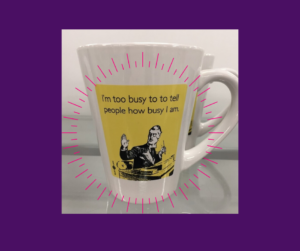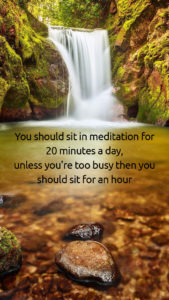The Dis-ease of Busyness
While the above novelty mug is meant to be funny, chronic “busy-ness” is seriously harming us. Scientific studies at Harvard revealed that bragging about being busy affects the same pleasure sensations of the brain we derive from food and money (however, bragging about being busy is considered way more socially acceptable than bragging about your fancy new luxury item).
But being busy feels good you might be thinking (and being a doer, I enthusiastically concur). However, it is the quality of the busyness that counts. Feeling fueled by a sense of meaningfulness and purpose greatly enhances quality of life, overall health, your relationships with Self, and your relationships with others (all good stuff).
Chronic busyness, the kind that comes from working several jobs trying to make ends meet (uncontrolled), or the kind of busyness that is self-induced, such as materialism and competing with others (keeping up with the Jones’) are the biggest contributors to stress.
Stress shows up in physical symptoms as fatigue, irritability, insomnia, anxiety, headaches, heartburn, bowel disturbances, back pain, and weight gain. There are no blood tests or X-rays diagnostic of this condition, and yet it’s easy to recognize. The condition is excessive busyness. (Dr. Susan Koven, 2013).
So, what can be done to reduce the stress from busyness?
- Reassess your values and beliefs. My early experience in counselling was working with youth and families. From a developmental perspective, adolescence is a time for exploring identity, so I would often include components of therapy that allowed for identification of one’s core values and beliefs. I have found that many adult clients also greatly benefit from a reassessment of personal values and beliefs. One of our sources of dis-ease, is when our actions do not align with our values and beliefs. Who might you be trying to appease (consciously or unconsciously) that is leaving you feeling as though you are not measuring up and increasing your stress? Is your chronic busyness motivated by feeling as though you should be doing so much (rather than a genuine desire)?
- Prioritize your health – not just your physical health, but your emotional, mental, and spiritual health. Many of the clients I see in my practice wait until things in their life have reached a crisis point and physical symptoms have manifested from unattended mental health issues. We are conditioned to accept the notion that exercising and going for yearly physical exams prevents illness. Taking care of our other facets of well-being does too.
- Recognize that self-care is NOT selfish. Stop saying yes to things when you want to say no. If you are tapped out and someone asks you to volunteer your time for something, you owe yourself the right to assert a healthy boundary and decline. Most of us have agreed to do something for someone else when we are bordering on overwhelm and we then find ourselves contending with feelings of resentment. I think of resentment as a valuable tool for us to pay attention to: if you’re experiencing resentment, then something in YOU needs to change (such as practicing healthy boundary-setting and prioritizing self-care!).
- Connect with others. We humans need positive social interaction for optimal well-being. Aim for low-stress socializing – a coffee date, phone conversation, or walk with a friend can fit this bill.
- Embrace a mindfulness practice. For more on this, see: https://blacksheepcounselling.com/2017/05/mindfulness-shmindfulness/
- Embrace a self-compassion practice. For more on this, see: https://blacksheepcounselling.com/2017/03/mindfulness-self-compassion/
- And lastly, resist comparing your journey with that of others; your journey is unique to YOU.
“Life is the most difficult exam. Many people fail because they try to copy others, not realizing that everyone has a different question paper.” – Unknown

~Christine
